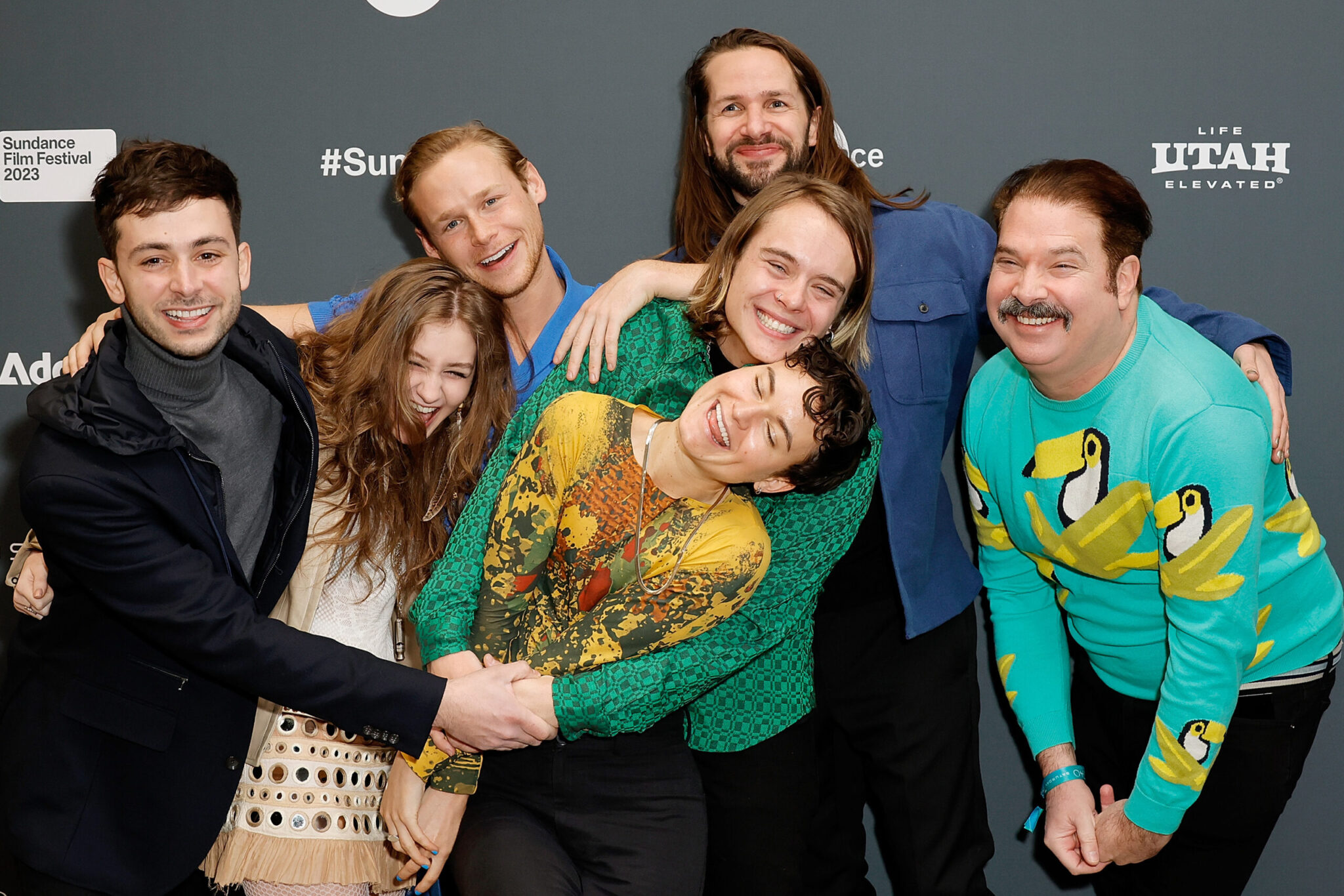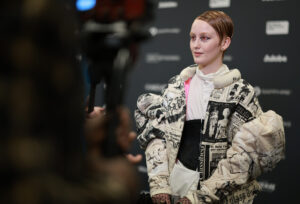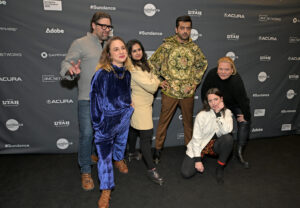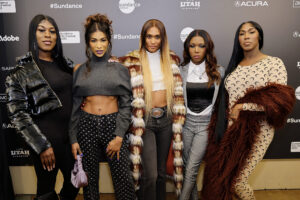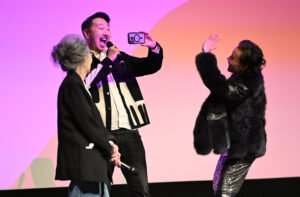PARK CITY, UTAH – JANUARY 23: (L-R) Stephen Scarpulla, MiMi Ryder, Cole Doman, Director Vuk Lungulov-Klotz, Lio Mehiel, Alexander Stegmaier and Joel Michaely attend the 2023 Sundance Film Festival “Mutt” Premiere at Eccles Center Theatre on January 23, 2023 in Park City, Utah. (Photo by Frazer Harrison/Getty Images)
by Aliese Muhonen
Talk about having a long day.
The roughly 24 hours that New Yorker Feña experiences in Mutt are like Murphy’s Law personified. There’s the desperately needed transport that falls through (twice!), an unintended hookup, an apartment lockout, and a needs-to-be-stitched forehead gash. And then there are the people: three pivotal relationships resurrect when he least expects, accentuating the intricacies and awkward territory that encapsulate his recent transition as a transgender man. And yet it may be exactly what the 20-something needs to move from his difficult past to a self-assured future.
It’s a new day for transgender stories, whose characters are notoriously under-represented in film. Director Vuk Lungulov-Klotz hopes to change that with Mutt, which premiered January 23 in the U.S. Dramatic Competition.
“I’m a trans man and I don’t see myself reflected in movies very much,” he says at the post-premiere Q&A. “So I wanted to create a portrait of a young trans man in New York that was really viewed through the eyes of people around him. I think seeing his transition to who he is now through his father, his little sister, [and] an ex-lover, I wanted to give him the empathy that I wish people would have given me when I came out.”
If the audience reaction is any indication — a chorus of enthusiastic cheers and eager questions — Lungulov-Klotz accomplished his mission.
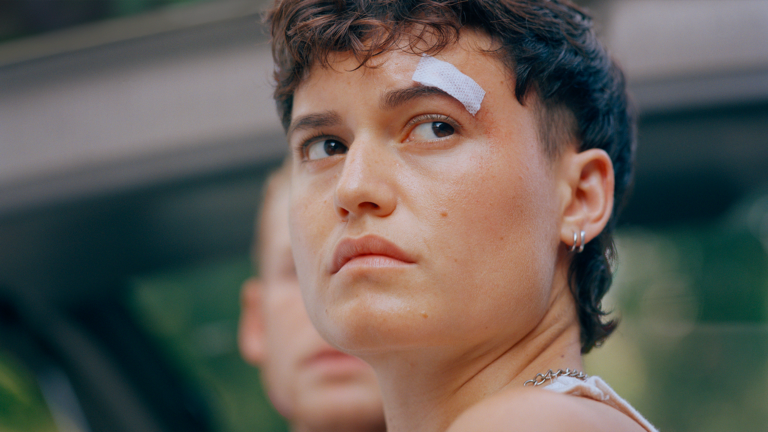
Simultaneously an intimate character study and a day-in-the-life snapshot of the transgender experience, the film balances poignant scenarios with complex characters that are superbly portrayed. The most significant of Feña’s conflicts concern his family and former lover, who are essentially meeting him for the first time since his transition. While they’re refreshingly open-minded (or at least willing to try to be), the questions they ask and situations they incite serve as a primer on what to do (and not do) when a loved one transitions. When Feña upbraids a family member who wonders how he could be trans — “Liking men doesn’t make me a woman, OK?” — it’s a plea for understanding to the viewer as much as the person he’s talking to.
The audience praised the cast’s palpable chemistry, as well as the resonance of their performances. Though it wasn’t easy to find someone to play Feña — Lungulov-Klotz searched for two years — non-binary actor Lío Mehiel was worth the wait.
The character breakdown in the script required an actor who could speak Spanish; convincingly look half-Chilean, half-Serbian; have top surgery scars; and be “sharp, but tender.”
“I was like, ‘That’s me too,” says Mehiel. They are Puerto Rican and Greek, and had had top surgery done six months prior. “So I emailed Vuk and I was like, ‘Will you please just give me this part? This is me. I will do this justice for you. And he sent me the script and I read it and it was like a full-stop moment. The script was so poetic and so real and so beautiful and I had never seen the complexity of my experience outside of the coming out story ever rendered, and so it was just such a blessing to be given this opportunity by Vuk and to be able to play this part.”
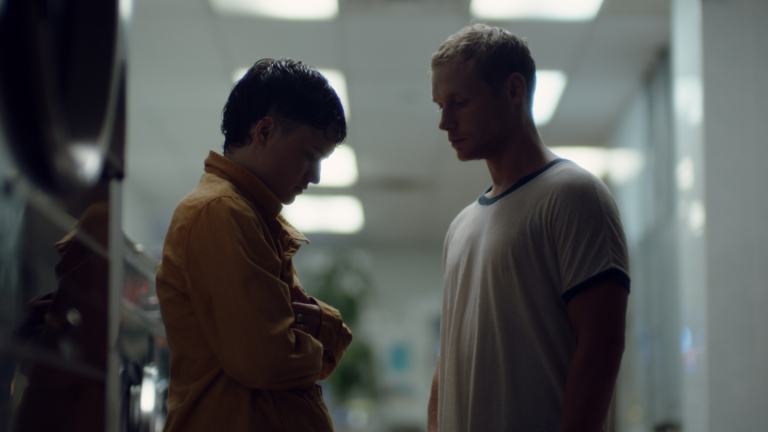
Audience members were also impressed by the unbelievably fast production time.
“We shot in September [2022],” says Lungulov-Klotz, eliciting gasps of admiration from the crowd. “So it’s kind of insane that we’re here right now; it’s been a very quick process.”
The touching end result may give the trans community (and everyone else) the authentic representation it’s been waiting for.
Explaining the title, the Serbian-Chilean Lungulov-Klotz says that he classifies himself as a mutt. “I feel like a lot of people in this room are mutts, and I really wanted to talk about the in-betweenness of everything, whether that’s identity, gender, sexuality, nationality, [or] race. And also the in-between space between people, and the fact that everyone is transitioning in some way or another, whether you’re trans or transitioning from some type of relationship to another, a job, etc. We’re all changing, so I think in a way we’re all mutts.”




